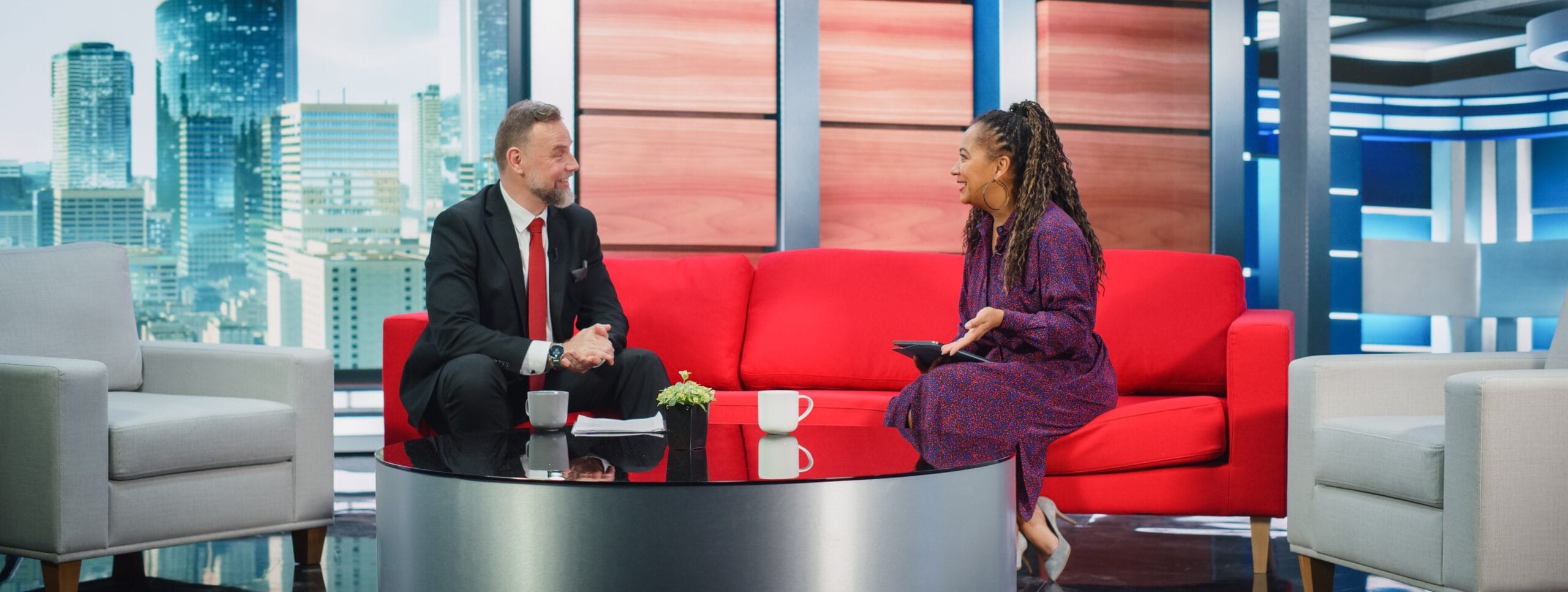
The Ultimate Guide to Speaking with the Media and Media Training
November 23, 2025
Speaking to the media can transform how people see you and your organisation. With media training, a strong media interview builds trust, shapes a story and shows you at your best. A weak interview does the opposite. Journalists move fast and ask tough questions. If you are not prepared, you risk giving unclear answers, losing control of your message or making mistakes that follow you for months.

Meet the Author: Benjamin Ball
Ben is the founder of London-based Benjamin Ball Associates and leads the presentation coaching and pitch deck creation teams. Formerly a corporate financier in the City of London, for 20+ years he’s helped businesses win with better pitches and presentations, particularly investor pitches. He is a regular speaker and a guest lecturer at Columbia Business School and UCL London. Follow Ben on LinkedIn or visit the contact page.
This guide shows you how to prepare for media interviews, how to speak clearly under pressure and how to build long-term media confidence. You will also learn when media training helps and where to find deeper resources, case studies and examples that bring the ideas to life.
Why Speaking Well to the Media Matters
Media interviews are one of the quickest ways to tell your story and reach a wider audience. A good interview strengthens your reputation. It helps you:
- explain your work in a way the public understands
- respond clearly to difficult questions
- stay calm when things feel high stakes
- share key messages that shape the narrative
- represent your organisation with confidence
If you need quick practical tips, this guide is a great place to start:
Media Interview Tips.
Ultimate Guide to Speaking to the Media
1. What Journalists Need From You
Journalists are not trying to catch you out. They are trying to get clear, quotable information that helps them illustrate a story. They need:
- short, clear answers
- examples that bring ideas to life
- a simple explanation of what you do
- your view on why something matters
- a calm tone regardless of the question
When you understand what the journalist needs, it becomes easier to prepare.
If you want a deeper understanding of how interviews work and how you can improve, take a look at:
Prepare for a Media Interview.
And read about the benefits of media training and how to give a stand out media interview.
2. How to Prepare for a Successful Media Interview
Good interviews start long before the camera rolls. Preparation helps you stay in control, even when questions are difficult or unexpected.
Here is how to prepare well:
Clarify your key messages
Decide the three points you want the audience to remember. Keep these short and simple.
Use examples
Examples make your messages stick. They help journalists quote you more accurately.
Anticipate tough questions
Think about the questions you expect and those you hope will not come up. Prepare short, calm responses for both.
Practise out loud
If you only prepare in your head, your answers won’t sound natural. Say them out loud. read how to rehearse a media interview
Rehearse under pressure
A colleague challenging you with tough questions helps you practise staying calm.
If you want structured help, see:
Media Training for Executives.
You may also find this video helpful:
What Are the Benefits of Media Training?
How to prepare for a media interview
3. The Essentials of Clear Media Communication
Media communication is different from internal communication. Journalists and audiences have limited time and short attention spans. You need to get your message across quickly.
Keep it simple
Avoid jargon and long, technical explanations. Short sentences sound more confident.
Sound natural
You do not need to be slick. You do need to be clear, warm and human.
Use your voice deliberately
Pace and tone matter. Speak more slowly than usual to stop nerves from creeping in.
Stay steady under pressure
Even in difficult interviews, you can stay calm if you prepare your key messages and rehearse.
A helpful resource is this video on strong media delivery:
How to Give a Stand Out Media Interview.
4. Handling Tough or Hostile Questions
Every spokesperson eventually faces uncomfortable questions. A journalist may challenge your decisions, ask for numbers you cannot share or bring up a recent mistake.
You can handle these situations without sounding evasive:
- Acknowledge the question before bridging back to your message
- Stay calm even if the journalist becomes more direct
- Avoid speculation
- Correct inaccuracies politely
- Bring the conversation back to what you can say
If you want to develop these skills in a safe environment, this course is a strong option:
Crisis Media Training.
And read how to transform your media interview skills
5. Mistakes That Undermine Your Media Interview
Many mistakes are predictable. The good news is that you can avoid them with the right preparation.
Common mistakes include:
- long, unfocused answers
- repeating the journalist’s negative language
- guessing when you are unsure
- saying “no comment” without offering a helpful alternative
- getting defensive
- speaking too quickly
- forgetting your audience
You can explore these mistakes in more detail here:
7 Bad Media Interview Mistakes.
6. Media Training: What It Is and When You Need It
Media training helps you speak clearly under pressure, handle difficult questions and explain your work in a way people understand. It also helps you rehearse real interview scenarios with expert feedback.
Media training is useful when:
- you have an important interview coming up
- your role involves regular media contact
- your organisation is going through a sensitive period
- you want to sharpen your confidence on camera
- you are preparing to speak about a complex topic
If you want structured help, here are useful starting points:
- General training:
Media Training for Executives - London-based training:
Media Training London - Crisis training:
Crisis Media Training
If you work in the charity sector, these tailored insights are valuable:
Media Training for Charities.
You’ll learn how to achieve success with media training
7. What Media Training Typically Includes
A good media training session gives you practical tools you can use straight away. Sessions usually include:
- exercises to clarify your key messages
- rehearsal interviews with realistic questions
- coaching on voice, tone and body language
- guidance on handling tough questions
- feedback to refine your answers
- advice on staying calm on camera
- practice for radio, TV and print conversations
You learn by doing, not just listening.
A short video overview is here:
What Are the Benefits of Media Training?.
8. Case Study: How Media Training Helps Spokespeople Perform at Their Best
Real examples show how valuable media training can be. This case study highlights how a spokesperson developed clarity, confidence and strong delivery:
WISE Media Training Spokesperson Case Study
It shows how rehearsal, clear messaging and handling tough questions can shift a spokesperson from unsure to confident in a short period of time.
Read more about how to become a compelling media interviewee
9. Preparing Your Organisation for Better Media Conversations
Media interviews are not just about the spokesperson. They reflect your entire organisation. When you prepare well at a team level, everything runs more smoothly.
Strong organisations:
- agree clear messages before any interview
- brief spokespeople properly
- avoid sharing sensitive details before checking facts
- review interview risks together
- support spokespeople after difficult conversations
Supporting your internal communications team and spokespeople with training helps your organisation feel more confident and less reactive.
10. Your Next Step
If you want to get better at speaking to the media, start by choosing one upcoming opportunity and preparing your messages early. Practise your answers out loud and challenge yourself with tough questions.
For structured support, explore:
Improving your media confidence helps you tell your story well, stay calm under pressure and protect your reputation when it matters most.
Why Choose Us:
Transform your pitches and presentations with tailored coaching

We can help you present brilliantly. Thousands of people in the UK, Europe and the Middle East have benefitted from our tailored in-house coaching and advice – and we can help you too.
“I honestly thought it was the most valuable 3 hours I’ve spent with anyone in a long time.”
Mick May, CEO, Blue Sky
For 15+ years we’ve been the trusted choice for leading businesses and executives throughout the UK, Europe and the Middle East. We’ll help you improve corporate presentations through presentation coaching, public speaking training and expert advice on pitching to investors.
Some recent clients

Unlock your full potential and take your presentations to the next level.
Speak to Louise on +44 20 7018 0922 or email info@benjaminball.com to transform your speeches, pitches and presentations.
Contact us now for free consultation
Start improving your pitches and presentations now
Contact us now and speak to an expert about getting award-winning coaching, training and advice